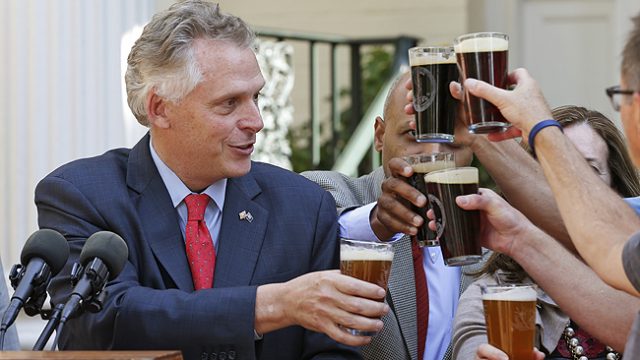Corporate tax deals soak Virginians

KEEP ‘EM COMING: Gov. Terry McAuliffe toasts Stone Brewing Co. after he funneled public funds to the California firm. The city of Richmond pitched in with a plan to build a brewery for the company on the James River.
By Kenric Ward | Watchdog.org Virginia Bureau
LESS IS MORE: House of Delegates Speaker Bill Howell takes a skeptical view of state tax incentives.
RICHMOND, Va. — Tax incentives for selected businesses are driving Virginia deeper into debt and House Speaker Bill Howell says he’s committed to curbing the special breaks.
“Virginia needs a tax code that encourages growth, and that means making it simpler and more transparent,” Howell told Watchdog.org. “We can eliminate those incentives and lower the overall tax burden on Virginia’s families and businesses.”
Despite imposing income taxes, property taxes, sales taxes, car taxes, higher gas taxes and a host of other levies, Virginia faces a projected revenue shortfall of $2.4 billion over the next three years.
State officials said $346 million more will have to be found in fiscal year 2015 and an additional $536 million will be needed in fiscal 2016.
Millions for out-of-state billionaires
Meanwhile, Gov. Terry McAuliffe, like his predecessors, is funneling millions in tax dollars to selected companies from an “Opportunity Fund.” The latest $5 million state spiffs went to firms based in California and China.
After less than a year in office, McAuliffe told the Washington Post he’s run through $68 million in an effort to kick-start Virginia’s stagnating economy.
Two dozen other corporate subsidy program, including Clean Energy Manufacturing Incentive Grants and Green Job Creation Tax Credits, hand hundreds of millions more to businesses each year.
“Now, McAuliffe needs more money from the General Assembly,” said Tim Wise, president of the Arlington County Taxpayers Association.
Howell, R-Falmouth, takes a dim view of the idea.
“Tax incentives have a role to play, but there has to be accountability to make sure those incentives are working. That is why the General Assembly passed legislation to sunset all new tax incentives,” Howell said.
“Some incentives have probably outlived their usefulness,” the speaker added. A House-Senate subcommittee, chaired by Sen. Jeff McWaters, R-Virginia Beach, is examining special breaks that have piled up over the years.
Because corporate incentives tilt the playing field in favor of state-subsidized “winners,” Virginia’s tax climate has turned chillier for business overall.
The Tax Foundation rates Virginia business tax load 27th in the nation. That’s a deterioration from 23rd in 2012.
Residents shoulder heavy tax load

TOLD YA: 2013 GOP gubernatorial candidate Ken Cuccinelli warned voters that they would pay for corporatist deal-making by Terry McAuliffe.
Even worse, the state’s individual tax ranking came in at a dismal 39th.
Retirees are punished by the state, which taxes their annuities, something even high-tax states like New York don’t do.
Residents pay their counties $400 and up for having two vehicles. This annual “car tax” is over and above what the Department of Motor Vehicles collects in fees and licenses.
More states are moving away from such tangible personal property taxes, and Virginia was heading that way 10 years ago. But then-Gov. Mark Warner kept the car tax in place.
Since the state hasn’t indexed its income tax brackets for inflation during the past three decades, Virginians earning just $17,000 a year pay the top rate today. (Note: A household of two making $17,808 qualifies for food stamps.)
Talk of raising taxes to plug the state’s deficit is dangerous, said Veronique deRugy, a policy analyst at George Mason University’s Mercatus Center.
“It’s a terrible idea. If you tax more of something, you get less. Tax cuts are what get you out of the red,” she said.
‘Discard the current tax system’
If McAuliffe insists on doling out more public money to private companies, Wise suggests a trade.
“In exchange for more incentive grants for more crony capitalism, perhaps the General Assembly should offer the governor an opportunity to sign a bill doing away with the corporate income tax,” Wise said.
Jettisoning the tax “would make Virginia products and services more competitive,” he reasoned. “And since a portion of the income tax comes from lowered wages, it would enable employees’ wages to increase.”
Mike Thompson, president of the Thomas Jefferson Institute for Public Policy, said, “Virginia’s competitiveness is falling.”
“I have always felt what is needed a group of serious folks — economists and others — to totally discard the current tax system and build one for today’s economy,” he said.
Kenric Ward is a national reporter for Watchdog.org and bureau of its Virginia Bureau. Contact him at (571) 319-9824. @Kenricward







